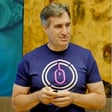
Deals, Data, and Deglobalization: Manish Sharma in the Hot Seat with Phil Fersht
How do you drive transformation when every global signal is flashing red, yellow... and green?
In this episode of From the Horse’s Mouth, Phil Fersht sits down with Manish Sharma, Chief Strategy and Services Officer for Accenture, to talk about navigating talent, geopolitics, trust, and transformation in an age of relentless change.
They delve into the "rebalancing" of globalization, exploring how the future of service delivery is shifting, why AI maturity is about people, not just technology, and what global business leaders are still getting wrong about partnerships and accountability.
What You’ll Hear in 30 Minutes
- How “re-globalization” is reshaping service delivery
- Why automation alone isn’t enough
- What boards really want from providers today
- The shift from cost to value: New KPIs for transformation
- The talent mindset needed for the AI-first world
- How Accenture is approaching trust, transformation, and partnerships
Guest Snapshots
Manish Sharma is Chief Strategy and Services Officer for Accenture. Previously he was CEO of The Americas in Accenture, the largest of Accenture’s worldwide geographic markets which includes the US, Canada and Latin America. He also served as CEO of North America, and formerly as Accenture’s Chief Operating Officer and Group Chief Executive of Operations. His leadership spans transformation at scale, digital reinvention, and deeply human leadership. Recognized as one of the top thinkers in global services and operations, Manish blends global delivery expertise with a sharp lens on what’s next.
Timestamps
00:00 – Intro and welcome
02:05 – From India to North America: Manish’s journey and leadership lens
05:10 – The new rules of globalization: Borders, supply chains, and trust
08:40 – Are delivery centers obsolete? Manish on the future of service delivery
11:00 – Why AI maturity isn’t just about tech—it’s about people readiness
13:45 – Rethinking partnerships: From FTEs to outcomes
16:20 – The boardroom’s new obsession: How to turn insights into execution
20:00 – Manish’s challenge to the industry: “Don’t just automate. Re-imagine.”
23:30 – Lightning round: What’s next for services, skills, and leadership
26:00 – Wrap-up
Explore More
- Manish Sharma on LinkedIn: https://www.linkedin.com/in/manish-sharma-bbb1a1
- Accenture North America: https://www.accenture.com/us-en
- Phil Fersht on LinkedIn: https://www.linkedin.com/in/pfersht/
- More insights from HFS: https://www.hfsresearch.com/








